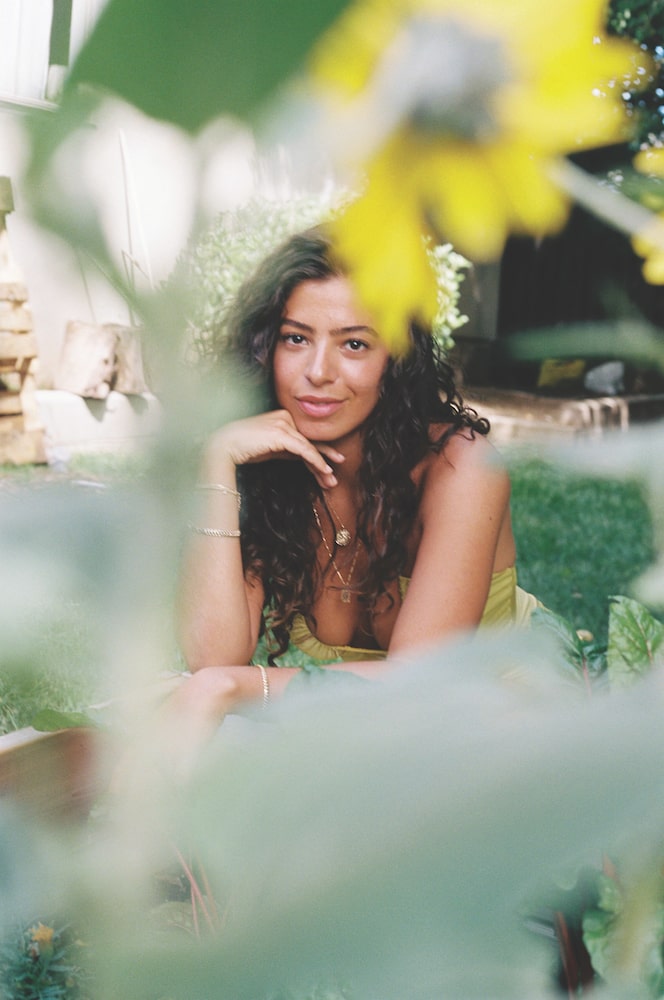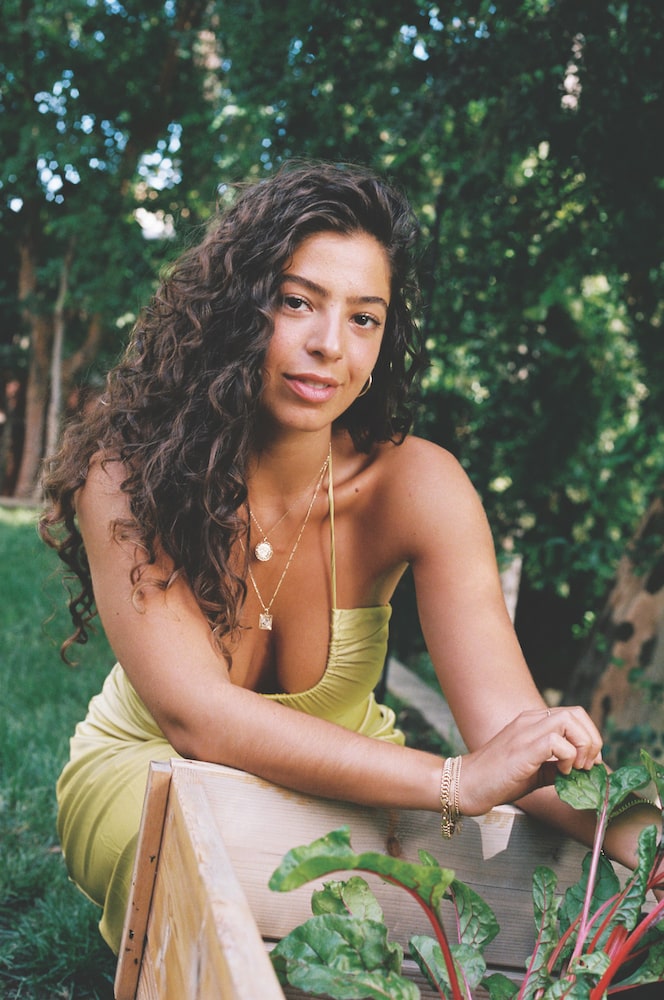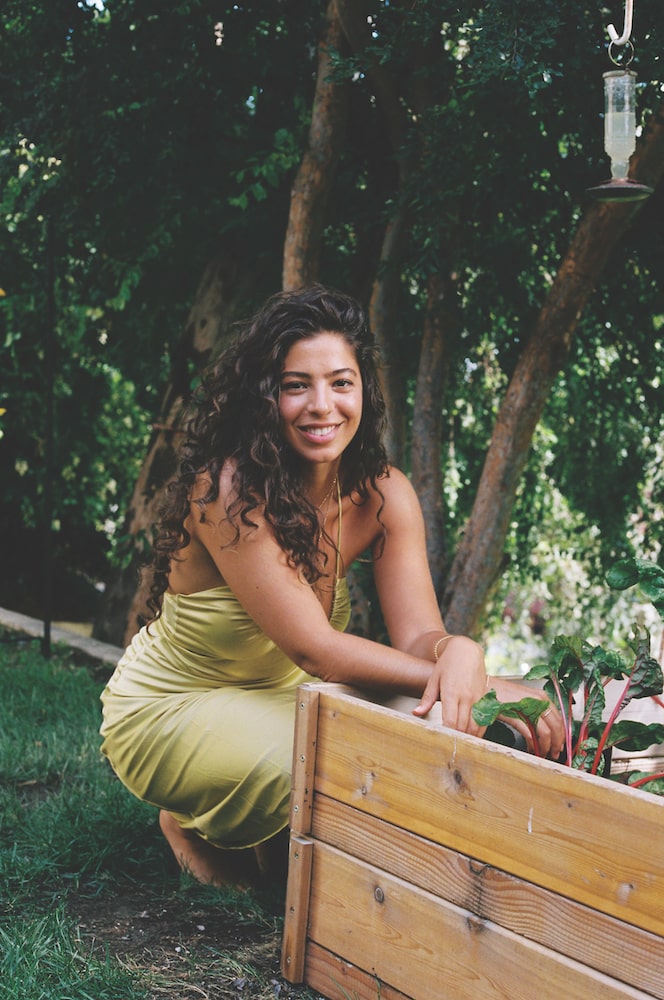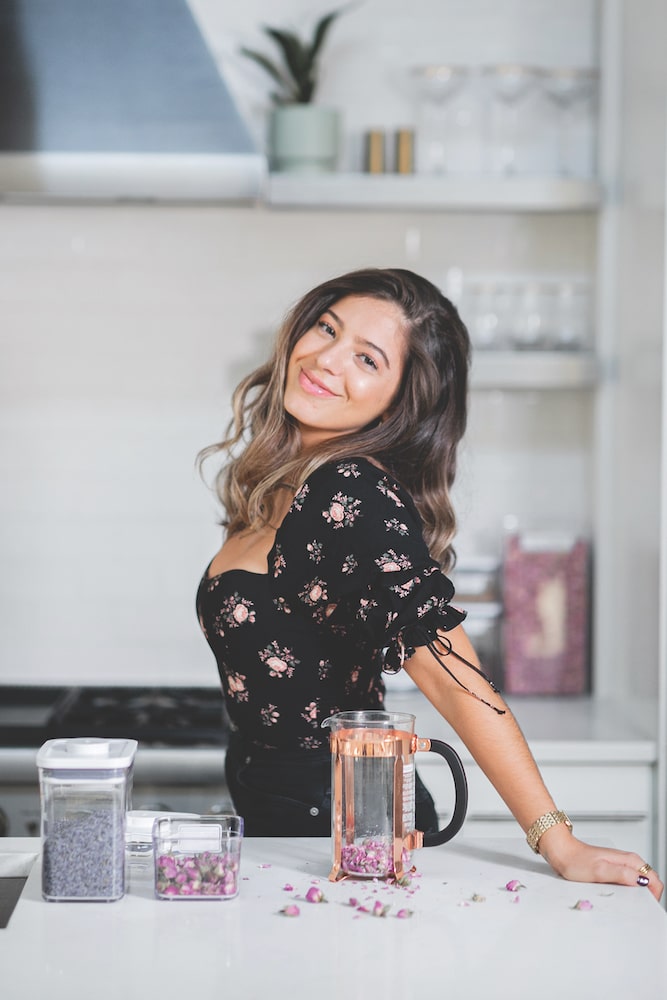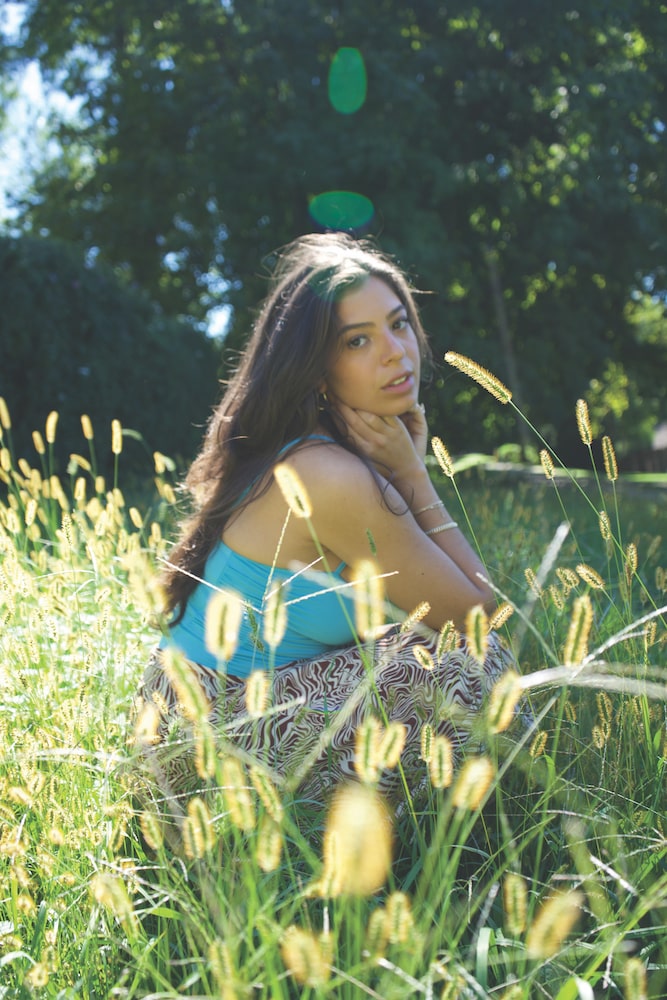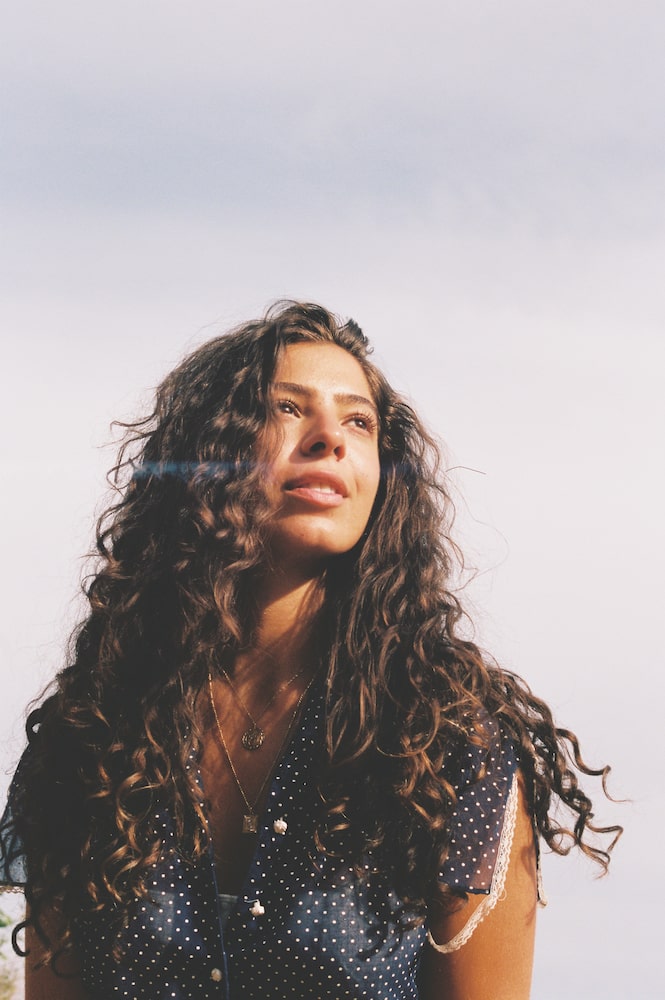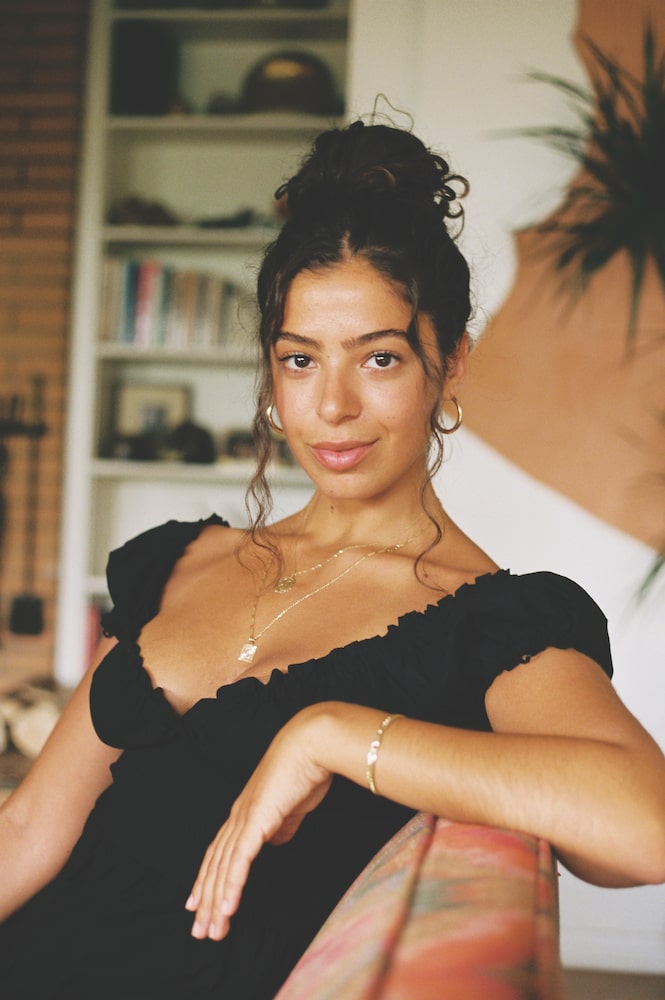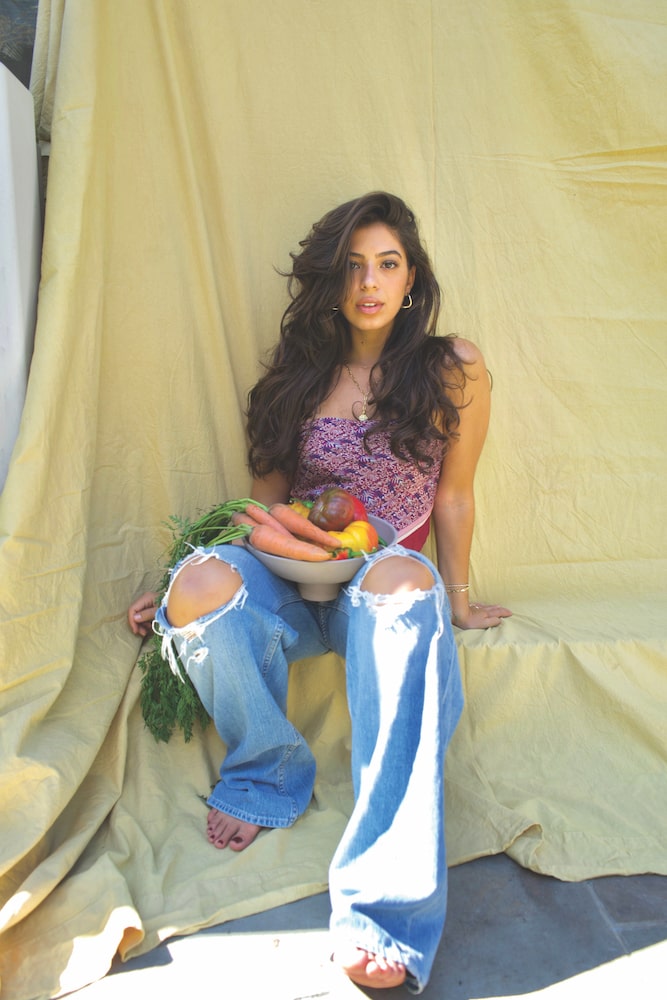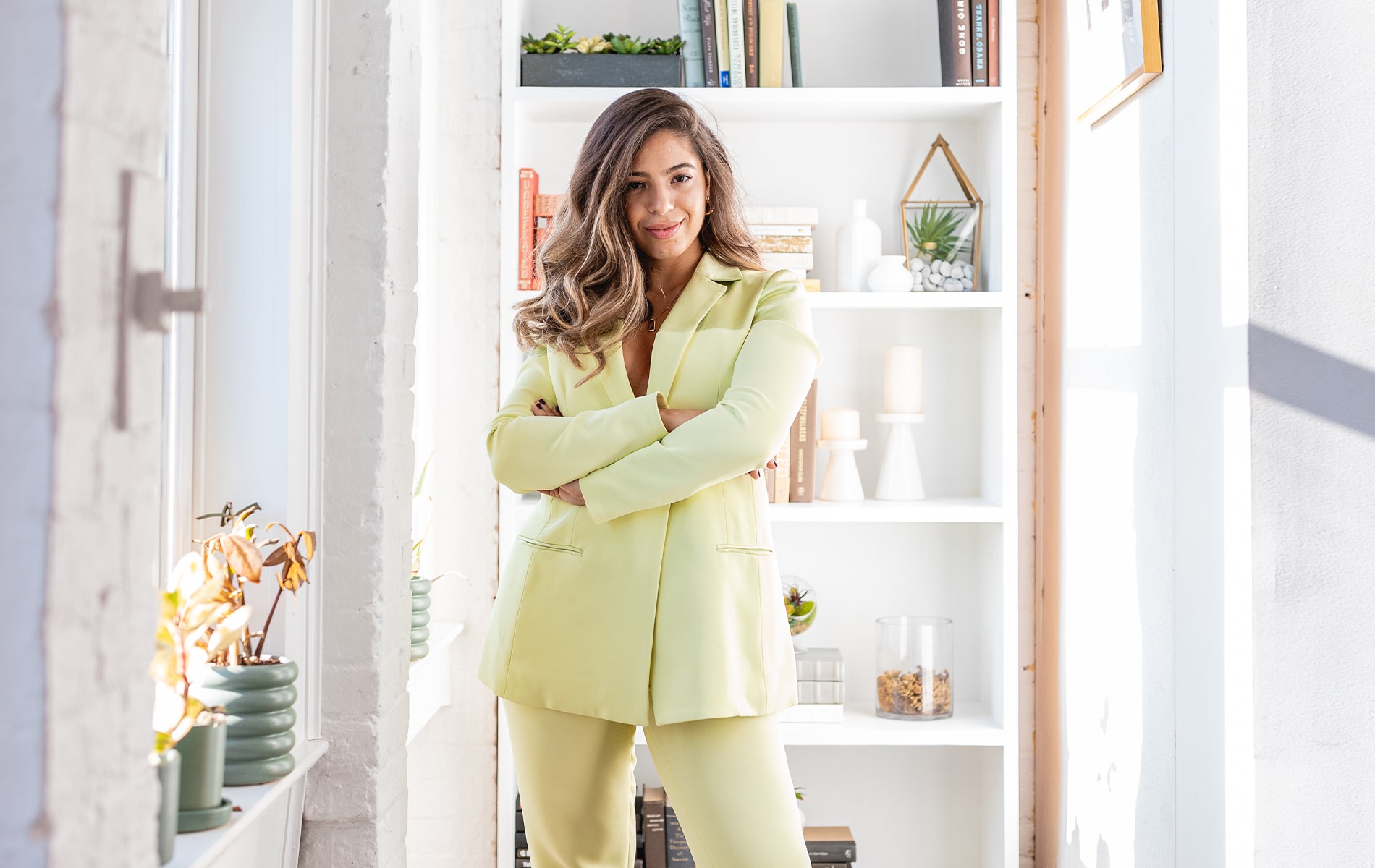
vie-magazine-organic-olivia-hero-min
Holistic Health and Herbalism
Ancient Wisdom Made Modern
By Hailey Bethke | Photography courtesy of Organic Olivia
Olivia Amitrano, herbalist, entrepreneur, podcaster, and founder of Organic Olivia, is bridging the gap between ancient wisdom and modern needs. She believes holistic health and the inherently medicinal properties of plants can support us in healing from the inside out. Western medicine and herbalist remedies need not be at war; together, Amitrano feels these systems can mutually support the healing process and empower us to operate from a place of optimized health.
Through the heart-centered narrative below, Amitrano shares her journey to becoming a certified herbalist and her favorite approaches for healing the body, mind, and soul. Herbalism is not something to be afraid of, and her suggestions will help you integrate plant remedies into your life without stress or feeling overwhelmed.
VIE: What inspired you to start Organic Olivia and your podcast, What’s The Juice?
Olivia Amitrano: Growing up, I had a variety of health issues that hit a peak in my teenage years. I struggled with severe IBS (irritable bowel syndrome) and relied on antispasmodic medications to make it through the day. I also had cystic acne and struggled with anxiety that deeply affected my quality of life. I began to notice that whenever I had an IBS flare, I’d also see an increase in breakouts and anxiousness—and vice versa: when I’d take an antibiotic to treat my acne, suddenly (albeit temporarily), my digestion and mental health would improve. This connection is known as “holistic” health, the notion that all systems of the body are interconnected, and seemingly unrelated symptoms can be traced to a deeper root cause.
After being told by doctors and specialists there was no way my symptoms were connected (and that food had nothing to do with my digestive complaints), I reached a breaking point and tried seeing an acupuncturist/herbalist, even though I grew up quite close-minded to “alternative” medicine. I knew there had to be an answer, a reason why I struggled with a picture of symptoms that my peers did not and why my body seemed to be far more sensitive and reactive than those around me. My body was clearly speaking to me, and I finally found out that my gut microbiome was sorely imbalanced. Because the gut-skin and gut-brain axes are so powerful, my digestion, skin, and mental health were directly affected by the dysbiosis of my intestinal ecology.
That herbalist sent me home with pungent capsules and earth-flavored potions I had never heard of to treat the overgrowths within my gut and support my liver and elimination organs as I embarked on this herbal protocol. Within two weeks, my stomach pain, cystic acne lesions, and mood improved more than with any intervention before—despite the countless medications I had tried. From that day on, I set out to learn about nutrition, herbs, and integrative tools that could support my body on a root-cause level.
Around 2012, I started a blog called Organic Olivia as I dove deeper into herbal medicine and changed my diet to more organic, whole foods. The blog cataloged my journey in real-time: what was working, how, and why. I felt that I couldn’t keep everything I was learning inside—the whole world deserved to have access to the insights that were helping me heal these chronic and debilitating symptoms. At the time, “wellness” wasn’t a thing, and “influencers” didn’t exist; the supplement industry went about as far as Dr. Oz on TV, and there was a huge gap in true, compassionate education surrounding natural healing modalities, dietary therapies, and plant medicines. I blogged daily about different herbs, emerging research on the gut microbiome, how to support detoxification and reduce exposure to environmental toxins, the importance of healthy fats and nutrition, the science behind lifestyle changes and exercise, and more. People resonated with the information, and I saw a major thirst for knowledge. As a country, we were (and still are) genuinely struggling with chronic illness and need not just the what but the “why” behind tools that can help. I have been through it and know how difficult it is to feel like your body is turning on you. In reality, your body needs the right conditions to thrive, and medicine needs to address root causes instead of the band-aid approach we’re often left so frustrated with.
I eventually completed a three-year clinical program at Arbor Vitae School of Traditional Herbalism as my blog grew into the company that is now Organic Olivia. I have a line of herbal formulas that I formulate based on the current literature, years of ancient tradition, my personal experience, and what I’ve learned working with clients. Blogging fell a bit out of fashion—people wanted to listen and watch instead of read, so I moved my educational content over to my podcast. My podcast is the heart of my work because I get to stay true to my original mission of sharing information and access to practitioners and insights that can change people’s lives.
My body was clearly speaking to me.
VIE: Share a struggle you have navigated related to personal growth or the wellness space. What tools did you use to help heal, and what did that experience look like for you?
OA: Something I struggled with until my very late twenties (thank you to the painful lessons of my Saturn Return) was low self-esteem, which caused me to be a bit self-centered in an attempt to protect my (quite fragile) sense of self. When you grow up in a chaotic household and have dysfunctional relationships with your caregivers—which many of us have experienced in some way, especially if your parents struggled with their mental health and didn’t have the tools we have today—your sense of inherent worth and identity can be so low and inconsistent, you end up seeking external validation to fill that void. You may turn to people-pleasing, but not in the “I just care so much about others” way that we think people-pleasing stems from. Instead, it may be in an “If I self-sacrifice, maybe they’ll have to like me” subconsciously egoic way that is at the core of this behavior.
For a long time, I struggled with what I thought was social anxiety—until I realized this anxiety was all about worrying if others liked me or approved of me. I felt I had to perform, to be the most exciting person in the room, until I learned that the most interesting thing about you is the interest you take in other people—the way you listen, ask questions, engage, and connect from a place of genuine curiosity and care. It’s not about you but the depth of connection and relationship you can foster with others. I thought the self-esteem I didn’t have could magically be built if others felt I was worthy; if only I could be successful, that would prove to myself and the world that I have worth, right? And yet, I finally learned that self-esteem cannot be transferred to you from an external source. No amount of followers, likes, pats on the back, friends, achievements, or accomplishments can give you what having a solid character, sticking by your word, showing up for yourself and others, and giving a **** about the world around you can. I found that self-esteem comes from estimable acts: following through when you say you will, having the courage and respect to be honest with those you love even if it’s difficult, going out of your way to be kind when no one will ever know it, working toward a mission greater than yourself, and doing the tiny, monotonous things each day that feel like nothing at the time but add up to self-respect through discipline and integrity.
Tools that helped me with this are psilocybin (psychedelic-assisted therapy, which can soon be done under the guidance of a practitioner legally in New York!), the book The Courage to Be Disliked, and life placing me in really tough situations where my back was against the wall. I had to learn the hard way that being uncomfortable and doing the difficult/right thing makes you feel a lot better than doing the easy/pleasurable thing.
VIE: We would love for you to introduce our audience to herbalism; please share why this medicine is not as scary or “woo woo” as some may think.
OA: Herbalism (the practice of herbal medicine) is the study of botany and the use of plants intended for medicinal purposes. Herbal medicine involves using plants, seeds, berries, roots, leaves, bark, or flowers in various forms and extractions (powders, capsules, tinctures, infusions, syrups) to support holistic wellness or treat specific conditions and imbalances. Plants have been the basis of medical treatments throughout human history, and thankfully, many traditional medicine systems have been documented and preserved and are still practiced today by over 80 percent of the world. This traditional practice has also informed how we use and develop modern interventions. Modern medicine, or what we know as “Western medicine,” utilizes many plant-derived compounds as the basis for highly effective pharmaceutical drugs. Aspirin, for example, contains the key component salicylic acid, which comes from willow bark, which has long been used to alleviate aches, pains, and fever. There’s also paclitaxel from the Pacific yew tree, which treats lung, ovarian, and breast cancer. Artemisinin from the traditional Chinese plant sweet wormwood can combat malaria. And there are many more.
While select active ingredients from the aforementioned plants have been isolated, synthesized, and standardized to serve as modern pharmaceuticals, there are thousands of plants on the face of this earth with medicinal benefits that have not been converted to pharmaceuticals yet still have immense therapeutic value when dosed in the right amounts for the right person. What’s more, when you are utilizing a whole herb versus a synthesized, singular compound, you benefit from the synergy within the whole plant’s many constituents and phytochemicals.
Plants can do many things for us physically, psychologically, emotionally, and spiritually. Adaptogens like ashwagandha, for example, help bolster our resilience in the face of stress, whether from physical demands or emotionally stressful circumstances. These plants act on the hypothalamic-pituitary-adrenal axis, modulating everything from our stress hormone (cortisol) to our beta-endorphin levels to the biosynthesis of ATP (helping us have more energy even when times get tough and we’re overextending). Adaptogens also stimulate our heat shock proteins (the same biochemical magic that happens in a sauna) to enhance the repair of damaged proteins when the body is under oxidative stress and prevent immune suppression when we’re taxed and depleted.
Some plants are antimicrobial—they have strong alkaloid compounds with broad antibacterial activity against everything from H. pylori to E. faecalis (think UTIs!). Some plants are considered “nervines”—they up-regulate calming neurotransmitters like GABA in the brain to decrease anxiety and increase our sense of calm. Others are called “bitters”—plants with fiercely bitter phytochemicals that make you pucker up but stimulate bitter taste receptors built into your tongue that activate your vagus nerve and signal the release of stomach acid and digestive enzymes to support digestion and prevent intestinal discomfort.
The true art of herbalism lies in the masterful combination, synergy, and dosage of the right medicinal plants for the right person to successfully target their individual root cause and help their body reach a state of balance. Just like people, herbs work better when they’re in a community, supported and balanced by others that offset what they may be lacking. For example, hundreds of herbs can support digestion; some may be warming, while others are cooling. Some help release gas from the intestines, while others help your gallbladder release bile to ensure you break down, emulsify, and absorb the healthy fats you eat. It’s important to pair a drying herb with a moistening herb so that the overall formulation helps you reach your goals but is neutral in its effect on your state of homeostasis. It gets more complex when formulating for complex conditions; there are multiple factors to address, which is where the help of an herbalist can come in.
I found that self-esteem comes from estimable acts: following through when you say you will, having the courage and respect to be honest with those you love even if it’s difficult, going out of your way to be kind when no one will ever know it, working toward a mission greater than yourself, and doing the tiny, monotonous things each day that feel like nothing at the time but add up to self-respect through discipline and integrity.
VIE: What is one health or wellness ritual you never skip, no matter how busy life gets?
OA: Eating fermented foods. I always have some form of ferment in my fridge, whether that’s beets, sauerkraut, kimchi, or goat kefir. When grabbing a snack or staring into the abyss of the fridge, I always remember to grab one of these and take a few bites. The difference it makes in maintaining my gut health is night and day—I’m less bloated, my bowels are more regular, and I’m less reactive to a few days of eating off my routine if I’m in a takeout rut from being super busy. Fermented foods make all the difference with their probiotics and post-biotics (aka the end products from the fermentation that the good bugs in these foods carry out). Post-biotics act as anti-inflammatory superstars and help keep your gut lining strong and tight, especially when you’re stressed or consume perhaps some irritating or processed foods your stomach is less-than-happy with. It’s just the easiest thing in the world to do, to add a few bites of fermented foods into your day.
VIE: What does living a vibrant, healthy life look and feel like to you?
OA: A vibrant and healthy life is one where I’m in tune with my rhythms and the rhythms of nature, leaning into the ebb and flow of my energy instead of forcing myself to show up each day as a carbon copy of the one before. I try to go inward in the fall and winter when it comes to the earth’s greater rhythms and honor the proverbial “fall and winter” of my menstrual cycle. I allow myself to open, express, and take action in the spring of my life’s chapters, knowing that a plant can’t bloom all year long and periods of rest and contraction are necessary and healthy; constant productivity comes at an alarming cost.
It means setting boundaries in my relationships—honoring my needs and respecting the needs and differences of others without attachment or judgment. I practice speaking my truth in a grounded and compassionate way, holding space when I can and having the confidence to say no when I can’t.
It means being of service whenever and wherever I can, whether to my loved ones, community, neighborhood, or the earth. I show up in truth and integrity so that others may do the same. I practice leading by example and offering honest, vulnerable insight and a helping hand. It’s tending to the plants and land around me, leaving places and spaces better than I found them physically and energetically, being mindful of the waste I create and how I am conditioned to consume mindlessly—and then choosing to hold everything in divine, high regard. It means being present with what is instead of desiring more, looking people in the eye, deeply listening, and connecting instead of consuming.
It looks like taking cues from the pace of the earth, moving as slowly as I need to in order to move with integrity. It’s appreciating the wind, the trees, the sounds around me, the uniqueness of all living things, and catching myself when judging instead of deeply seeing and witnessing. It involves getting out of my comfort zone, looking at the things that are difficult to see—the parts of myself and humanity that need tending and care—having the hard conversations, making the journey out of my bubble, constantly learning and humbling. It means putting people and purpose over profit, art over productivity, and intention over autopilot. It means truly being here, no matter how painful that is sometimes—staying with the pain to feel the joy.
VIE: How do you connect with your most authentic and aligned self? How do you return to that place when in an energetic funk?
OA: If you’re feeling out of touch with your authentic self and intuition, you may not be able to hear or know what’s a “yes” for you immediately, but the place to start is your “no.” Usually, our no is far clearer; our bodies clam up and reject the thing that’s not for us or off our path. We’ll have physical signs of discomfort or feel fatigued. When we try to force it and push through doing the thing that’s not in alignment with our authentic selves (whether that’s going out drinking with friends or saying yes to a work opportunity that looks good on paper but isn’t in alignment with our soul’s path), we end up feeling worse, hitting a wall, and can be zapped of our life force and joy.
On the other hand, when you are in touch with your authentic self and what a true yes is for you, things will feel light, inspiring, and exciting. It may not be easy—it will require work and focus. Still, doors will open naturally; you’ll receive opportunities by going toward that path, you’ll meet people of the same heart and mission whom you’re meant to co-create with, and synchronicities will appear all around you if you take the time to notice them (some may say coincidence, but some things are just too wild).
Being honest is also a beautiful way to connect with your authentic self. Spend plenty of time alone so you can hear your voice and needs. Take yourself on dates, and write in a journal to give yourself a voice and open up a conversation. Be brutally honest about where you can do and be better, where you didn’t act with integrity, who you want to be, and the steps you need to take to get there, re-parenting yourself in a sense with gentle discipline and radical honesty. Be honest with others, share when you’re hurting and what you’re going through, paving the way for them to do the same and be mirrored and heard.
VIE: What are some tips for finding balance and prioritizing joy? How do you pour into your relationships and work life while still holding space for yourself to rest and reflect?
OA: I find balance by resting as much as I work, leaning into my rhythms, and saying no when I’m exhausted. I stop midday to take a bath when I need to, schedule a weekly massage or acupuncture session, and don’t cancel it even if it seems like a meeting is ten times more important—99 percent of the time, it can wait or be moved around on the calendar. I check in with friends and family, call loved ones often, and remind myself there is a whole world outside work. Being productive or successful is only a tiny part of what matters; family and community matter much more. I schedule friend and family time on my calendar like I schedule meetings. I also plan rest time and nights where I do absolutely nothing but watch the Real Housewives and eat gluten-free Oreos.
You can only be good at one or two things each day. Some days, you’ll be a really good dog mom, an excellent wife, or a killer CEO. When your brain is in CEO idea mode, lean into it and get as much as you can out of it; juice it until it’s dry and know that you probably won’t get an A-plus on checking in with friends or being social that day, but tomorrow is another opportunity. Then, when your friend calls tomorrow mid-breakup and needs a shoulder to cry on, you can be present because you absolutely killed it the day prior and leaned into your rhythms and what was coming through. You can be there for her guilt-free because you were entirely what you needed to be the day prior. For me, having blinders on can be a good thing. Having a lack of balance can actually be a skill. Different days, weeks, months, or years ask totally different things of you. It’s about hearing what that day or moment needs of you, who needs you, what you need from yourself, and going full force—or resting when that’s calling you. You need to contract before you can even think about expanding again.
Some days, your business needs you. Some days, your husband or family needs you. Some days, you need not to be needed. All of them are okay, and one is not better than another; your worth is not tied to how you show up in these areas at the same time. It’s about the culmination of how you show up over time, spread out your energy, and call to precisely what needs your attention at the right time. Once you start doing this, people learn that this is how you work; they know you come in waves and deliver when you do, and when you’re quieter or distant, it’s because something good is coming when you’re ready. You have to learn how to respect your workflow and how you uniquely achieve balance and stand in it unapologetically, even if others expect you to be everything to everyone at all times. There’s just no way—it’s impossible!
VIE: What has your journey with podcasting looked like from your first episode to now? How do you hope listeners will feel after tuning in?
OA: It’s been a wild journey. Our topics have evolved so much, from purely physical health to getting into the nitty-gritty of the emotional and spiritual pieces of our health. I used to think we could get to the root of different conditions and symptoms with the physical alone: my beloved herbs, lifestyle changes, sleep, proper exercise, nutrition—and yes, all those things matter. But if you’re in fight-or-flight mode 24/7, if you have unresolved trauma, if you’re not allowing yourself to feel the massive waves of the human experience, and if your nervous system doesn’t have the tools or space to express and self-regulate, sometimes, none of those things will scratch the surface. I’m all about the nervous system now and hope to continue giving people tools to help them reach a state of true freedom and awareness regarding their emotions, needs, and human experiences. I always hope my listeners leave feeling empowered, educated, inspired, and motivated to make just one tiny change—take one nugget and really incorporate it into their lives. I hope they feel validated and heard and can see themselves in me or my guests and know they’re not alone. Other people are going through what they go through, and solutions are out there!
Some of my favorite episodes to start with are:
- ARE YOU ADDICTED TO DRAMA? – How to Break Free From Cycles of Pain, Limiting Beliefs, and Trauma with Dr. Scott Lyons
- THE BINGE EATING EPISODE – Addressing the Root Causes of Disordered Eating through Nervous System Regulation with Stephanie Mara Fox
- HOW TO GIVE YOUR BODY A “SOFTWARE UPDATE” – The Art of Updating Your Physical Body on Emotional Breakthroughs for Better Lymphatic Drainage, Emotional Release, and Brain-Body Connection with Julie Tracy
— V —
To connect with Olivia Amitrano, follow her on Instagram @organic_olivia and @shoporganicolivia, tune into the What’s The Juice Podcast on all listening platforms, and shop her complete line of herbal formulas on OrganicOlivia.com/collections/all.
Rapid-Fire Questions with Olivia Amitrano
What’s one piece of advice you would give to your twenty-year-old self? It’s not what they call you; it’s what you answer to. People will call you a lot of things; they’ll want to put you in neat boxes that align with their preconceived judgments and the limits of their personal worldview. After all, that’s what makes us feel safe evolutionarily. If we can name something, compare it, and judge it based on something we already think we know, we feel we have a sense of control. People will project onto you (the good and the bad), misunderstand you (but it is your job and your job only to understand yourself), and force their expectations onto you. It’s up to you to avoid answering the call, continue on your path, and dance your own dance. It’s not theirs to understand, and it’s not yours to explain to anyone but yourself. If you’re dependent on people’s praise, you’ll also be a victim of their criticism, so do what you feel is right, wake up every day and try to make a difference, share your work and art, and be good to people. If they like you, it doesn’t matter. If they don’t like you, the good news is that doesn’t matter either. All that matters is that you’re doing what you were put on this earth to do and answering your soul’s highest calling with integrity and courage.
What’s your favorite mantra? It’s okay for my relationships to grow and change.
Which herb is your favorite? Ginger: it’s a kitchen medicine and one of the most potent herbs for digestion, constipation, circulation, and instantly modulating your microbiome for the better (thanks to its antimicrobial and anti-fungal properties). I don’t go a day without ginger tea in the colder months. It’s not only physically powerful for digestive complaints and those with a history of IBS and gut infections like SIBO (thanks to its anti-inflammatory, pro-kinetic properties that encourage peristalsis and correct constipation); it’s also emotionally and spiritually powerful. It’s a solar plexus, Spleen Qi activating herb that puts us in touch with our personal power, drive, and passion. When you’re feeling disempowered and disconnected from yourself and your purpose, daily ginger tea can help strengthen your sense of identity, power, ability to take action, and intuition.
What’s one thing that will always make you laugh? The Mindy Project. I must have rewatched it three times simply for Ike Barinholtz’s comedic genius.
What is an intention you’re setting for 2024? To free and heal my imagination, to get back in touch with my inner child and sense of wonder—my art comes from my inner child, so my relationship with her is number one.
What’s your favorite form of movement? Lifting weights. Resistance training helped me reverse prediabetes and get in the best shape of my life at age thirty, and I love walking over to the free weights rack, picking up some dumbbells, and feeling strong!
What is the best part of your morning routine? “Morning pages”—a technique for self-connection from the book The Artist’s Way. Upon waking, you write three pages of a stream of consciousness. It could simply be, “I’m so annoyed that I have to write these pages this morning. I have so much on my plate and am already behind.” Or, it could be the most profound reflection of your life brought upon by one of your dreams the night before. It’s not always joyful—sometimes it’s tough to get myself to do it—but the reward is always pure joy and release, plus fostering a deep relationship with myself in a way that no other practice allows.
What are your skin-care secrets? Lots of hydrating mists and essences. Some days, I layer three different mists before putting on a single serum. Until my skin is drenched with one of these, I feel like none of my other hydrating products absorb—I once heard an esthetician describe it as “loosening the soil,” and I couldn’t agree more. I’ll never go back to putting products on a dry face!
Share This Story!
KEEP UP WITH THE LATEST STORIES FROM VIE



